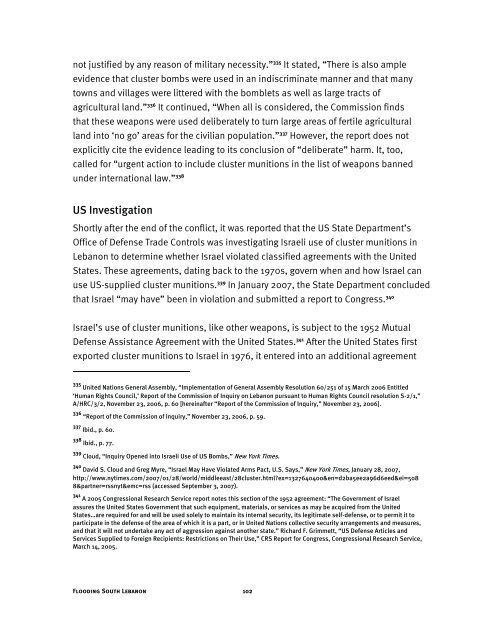Flooding South Lebanon - Human Rights Watch
Flooding South Lebanon - Human Rights Watch
Flooding South Lebanon - Human Rights Watch
You also want an ePaper? Increase the reach of your titles
YUMPU automatically turns print PDFs into web optimized ePapers that Google loves.
not justified by any reason of military necessity.” 335 It stated, “There is also ample<br />
evidence that cluster bombs were used in an indiscriminate manner and that many<br />
towns and villages were littered with the bomblets as well as large tracts of<br />
agricultural land.” 336 It continued, “When all is considered, the Commission finds<br />
that these weapons were used deliberately to turn large areas of fertile agricultural<br />
land into ‘no go’ areas for the civilian population.” 337 However, the report does not<br />
explicitly cite the evidence leading to its conclusion of “deliberate” harm. It, too,<br />
called for “urgent action to include cluster munitions in the list of weapons banned<br />
under international law.” 338<br />
US Investigation<br />
Shortly after the end of the conflict, it was reported that the US State Department’s<br />
Office of Defense Trade Controls was investigating Israeli use of cluster munitions in<br />
<strong>Lebanon</strong> to determine whether Israel violated classified agreements with the United<br />
States. These agreements, dating back to the 1970s, govern when and how Israel can<br />
use US-supplied cluster munitions. 339 In January 2007, the State Department concluded<br />
that Israel “may have” been in violation and submitted a report to Congress. 340<br />
Israel’s use of cluster munitions, like other weapons, is subject to the 1952 Mutual<br />
Defense Assistance Agreement with the United States. 341 After the United States first<br />
exported cluster munitions to Israel in 1976, it entered into an additional agreement<br />
335 United Nations General Assembly, “Implementation of General Assembly Resolution 60/251 of 15 March 2006 Entitled<br />
‘<strong>Human</strong> <strong>Rights</strong> Council,’ Report of the Commission of Inquiry on <strong>Lebanon</strong> pursuant to <strong>Human</strong> <strong>Rights</strong> Council resolution S-2/1,”<br />
A/HRC/3/2, November 23, 2006, p. 60 [hereinafter “Report of the Commission of Inquiry,” November 23, 2006].<br />
336 “Report of the Commission of Inquiry,” November 23, 2006, p. 59.<br />
337 Ibid., p. 60.<br />
338 Ibid., p. 77.<br />
339 Cloud, “Inquiry Opened into Israeli Use of US Bombs,” New York Times.<br />
340 David S. Cloud and Greg Myre, “Israel May Have Violated Arms Pact, U.S. Says,” New York Times, January 28, 2007,<br />
http://www.nytimes.com/2007/01/28/world/middleeast/28cluster.html?ex=1327640400&en=d2ba5ee2a96d6eed&ei=508<br />
8&partner=rssnyt&emc=rss (accessed September 3, 2007).<br />
341 A 2005 Congressional Research Service report notes this section of the 1952 agreement: “The Government of Israel<br />
assures the United States Government that such equipment, materials, or services as may be acquired from the United<br />
States…are required for and will be used solely to maintain its internal security, its legitimate self-defense, or to permit it to<br />
participate in the defense of the area of which it is a part, or in United Nations collective security arrangements and measures,<br />
and that it will not undertake any act of aggression against another state.” Richard F. Grimmett, “US Defense Articles and<br />
Services Supplied to Foreign Recipients: Restrictions on Their Use,” CRS Report for Congress, Congressional Research Service,<br />
March 14, 2005.<br />
<strong>Flooding</strong> <strong>South</strong> <strong>Lebanon</strong> 102
















